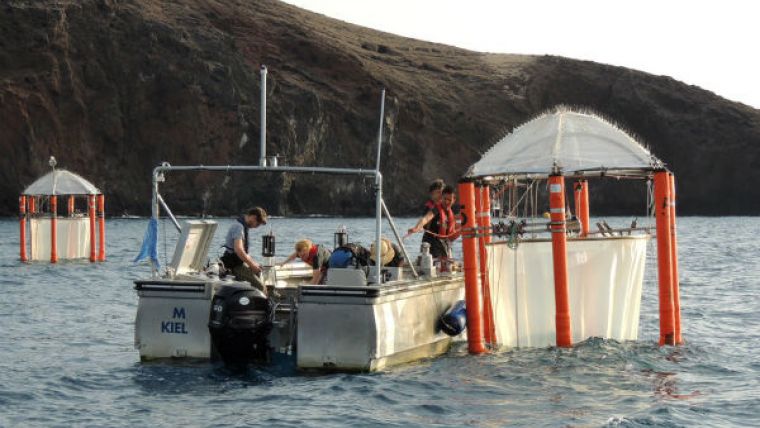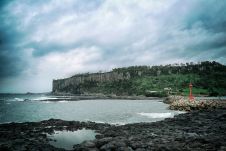Cooperation in Science, Technology and Education in Gran Canaria
GEOMAR Helmholtz Centre for Ocean Research Kiel (Germany), the Oceanic Platform of the Canary Islands (PLOCAN) and the University of Las Palmas de Gran Canaria (ULPGC) have joined forces to boost marine research activities, education and technology in Gran Canaria. The three partners signed an agreement at the Presidency of the Government of the Canary Islands while a long-term mesocosm experiment on the effects of ocean acidification is running at PLOCAN under the direction of GEOMAR.
While a large in-situ experiment on the effects of ocean acidification carried out in cooperation between GEOMAR Helmholtz Centre for Ocean Research Kiel and the Oceanic Platform of the Canary Islands (PLOCAN) goes for its final spurt, the two institutions initiated a joint collaboration with the University of Las Palmas de Gran Canaria (ULPGC). The three partners aim to develop new scientific activities in the field of marine research, technology development as well as training and to promote an understanding of the oceans and their socio-economic importance. The agreement was signed by the executive director of GEOMAR, Prof. Peter M. Herzig, the vice chancellor for Research at ULPGC, Antonio Falcón, and the director of PLOCAN, Octavio Llinás, at the Presidency of the Government of the Canary Islands in the presence of the Head of the Canary Government, Paulino Rivero Baute.
For PLOCAN, the agreement is part of a strategy to support networking between internationally leading research groups and local teams with the aim of developing highly valued socio-economic projects in the Canary Islands.
The agreement acknowledges a cooperation that has been in good progress for some months already. Since the beginning of 2014, an international team of scientists has been investigating the effects of ocean acidification in the oligotrophic open seas off Gran Canaria with the support of PLOCAN and ULPGC. At the end of September, nine KOSMOS mesocosms (KOSMOS: Kiel Off-Shore Mesocosms for Future Ocean Simulations) were deployed at Gando Bay. These floating structures allow for long-term carbon dioxide perturbation experiments under natural conditions. Until the end of November, the scientists measure about 50 different biological, chemical and physical parameters and collect samples for further analyses. For the first time, a deep-water collector was used to simulate an upwelling event in the “giant test tubes”.
Image: Sampling of mesocosms. Image courtesy: Ulf Riebesell, GEOMAR.














